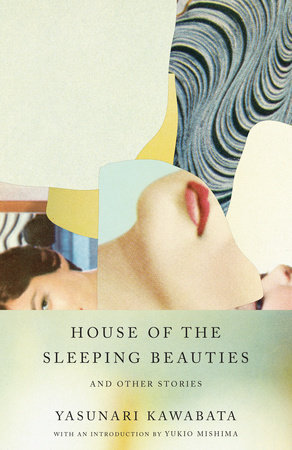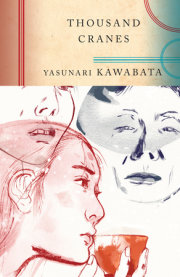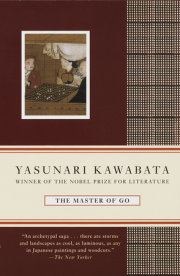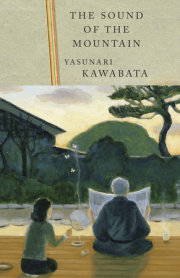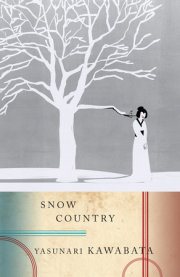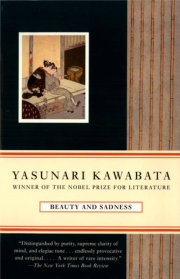House of the Sleeping Beauties
1
He was not to do anything in bad taste, the woman of the inn warned old Eguchi. He was not to put his finger into the mouth of the sleeping girl, or try anything else of that sort.
There were this room, some four yards square, and the one next to it, but apparently no other rooms upstairs; and, since the downstairs seemed too restricted for guest rooms, the place could scarcely be called an inn at all. Probably because its secret allowed none, there was no sign at the gate. All was silence. Admitted through the locked gate, old Eguchi had seen only the woman to whom he was now talking. It was his first visit. He did not know whether she was the proprietress or a maid. It seemed best not to ask.
A small woman perhaps in her mid-forties, she had a youthful voice, and it was as if she had especially cultivated a calm, steady manner. The thin lips scarcely parted as she spoke. She did not often look at Eguchi. There was something in the dark eyes that lowered his defenses, and she seemed quite at ease herself. She made tea from the iron kettle on the bronze brazier. The tea leaves and the quality of the brewing were astonishingly good, for the place and the occasion—to put old Eguchi more at ease. In the alcove hung a painting by Kawai Gyokudō, probably a reproduction, of a mountain village warm with autumn leaves. Nothing suggested that the room had unusual secrets.
“And please don’t try to wake her. Not that you could, whatever you did. She’s sound asleep and knows nothing.” The woman said it again: “She’ll sleep on and on and know nothing at all, from start to finish. Not even who’s been with her. You needn’t worry.”
Eguchi said nothing of the doubts that were coming over him.
“She’s a very pretty girl. I only take guests I know I can trust.”
As Eguchi looked away his eye fell to his wrist watch.
“What time is it?”
“A quarter to eleven.”
“I should think so. Old gentlemen like to go to bed early and get up early. So whenever you’re ready.”
The woman got up and unlocked the door to the next room. She used her left hand. There was nothing remarkable about the act, but Eguchi held his breath as he watched her. She looked into the other room. She was no doubt used to looking through doorways, and there was nothing unusual about the back turned toward Eguchi. Yet it seemed strange. There was a large, strange bird on the knot of her obi. He did not know what species it might be. Why should such realistic eyes and feet have been put on a stylized bird? It was not that the bird was disquieting in itself, only that the design was bad; but if disquiet was to be tied to the woman’s back, it was there in the bird. The ground was a pale yellow, almost white.
The next room seemed to be dimly lighted. The woman closed the door without locking it, and put the key on the table before Eguchi. There was nothing in her manner to suggest that she had inspected a secret room, nor was there in the tone of her voice.
“Here is the key. I hope you sleep well. If you have trouble getting to sleep, you will find some sleeping medicine by the pillow.”
“Have you anything to drink?”
“I don’t keep spirits.”
“I can’t even have a drink to put myself to sleep?”
“No.”
“She’s in the next room?”
“She’s asleep, waiting for you.”
“Oh?” Eguchi was a little surprised. When had the girl come into the next room? How long had she been asleep? Had the woman opened the door to make sure that she was asleep? Eguchi had heard from an old acquaintance who frequented the place that a girl would be waiting, asleep, and that she would not awaken; but now that he was here he seemed unable to believe it.
“Where will you undress?” She seemed ready to help him. He was silent. “Listen to the waves. And the wind.”
“Waves?”
“Good night.” She left him.
Alone, old Eguchi looked around the room, bare and without contrivance. His eye came to rest on the door to the next room. It was of cedar, some three feet wide. It seemed to have been put in after the house was finished. The wall too, upon examination, seemed once to have been a sliding partition, now sealed over to make the secret chamber of the sleeping beauties. The color matched that of the other walls but seemed fresher.
Eguchi picked up the key. Having done so, he should have gone into the next room; but he remained seated. It was as the woman had said: the sound of the waves was violent. It was as if they were beating against a high cliff, and as if this little house were at its very edge. The wind carried the sound of approaching winter, perhaps because of the house itself, perhaps because of something in old Eguchi. Yet it was quite warm enough with only the single brazier. The district was a warm one. The wind did not seem to be driving leaves before it. Having arrived late, Eguchi had not seen what sort of country the house lay in; but there had been the smell of the sea. The garden was large for the size of the house, with a considerable number of large pines and maples. The needles of the pines lay strong against the sky. The house had probably been a country villa.
The key still in his hand, Eguchi lighted a cigarette. He took a puff or two and put it out; but a second one he smoked to the end. It was less that he was ridiculing himself for the faint apprehension than that he was aware of an unpleasant emptiness. He usually had a little whisky before going to bed. He was a light sleeper, given to bad dreams. A poetess who had died young of cancer had said in one of her poems that for her, on sleepless nights, “the night offers toads and black dogs and corpses of the drowned.” It was a line Eguchi could not forget. Remembering it now, he wondered whether the girl asleep—no, put to sleep—in the next room might be like a corpse from a drowning; and he felt some hesitation about going in to her. He had not heard how the girl had been put to sleep. She would in any case be in an unnatural stupor, not conscious of events around her, and so she might have the muddy, leaden skin of one racked by drugs. There might be dark circles under her eyes, her ribs might show through a dry, shriveled skin. Or she might be cold, bloated, puffy. She might be snoring lightly, her lips parted to show purplish gums. In his sixty-seven years, old Eguchi had passed ugly nights with women. Indeed the ugly nights were the hardest ones to forget. The ugliness had had to do not with the appearance of the women but with their tragedies, their warped lives. He did not want to add another such episode, at his age, to the record. So ran his thoughts, on the edge of the adventure. But could there be anything uglier than an old man lying the night through beside a girl put to sleep, unwaking? Had he not come to this house seeking the ultimate in the ugliness of old age?
The woman had spoken of guests she could trust. It seemed that everyone who came here could be trusted. The man who had told Eguchi of the house was so old that he was no longer a man. He seemed to think that Eguchi had reached the same stage of senility. Probably because the woman of the house was accustomed only to making arrangements for such old men, she had turned upon Eguchi a look neither of pity nor of inquiry. Still able to enjoy himself, he was not yet a guest to be trusted; but it was possible to make himself one, because of his feelings at that moment, because of the place, because of his companion. The ugliness of old age pressed down upon him. For him too, he thought, the dreary circumstances of the other guests were not far off. The fact that he was here surely indicated as much. And so he had no intention of breaking the ugly restrictions, the sad restrictions imposed upon the old men. He did not intend to break them, and he would not. Though it might be called a secret club, the number of old men who were members seemed to be few. Eguchi had come neither to expose its sins nor to pry into its secret practices. His curiosity was less than strong, because the dreariness of old age lay already upon him too.
“Some gentlemen say they have good dreams when they come here,” the woman had said. “Some say they remember how it was when they were young.”
Not even then did a wry smile come over his face. He put his hands to the table and stood up. He went to the cedar door.
“Ah!”
It was the crimson velvet curtains. The crimson was yet deeper in the dim light. It was as if a thin layer of light hovered before the curtains, as if he were stepping into a phantasm. There were curtains over the four walls. The door was curtained too, but the edge had been tied back. He locked the door, drew the curtain, and looked down at the girl. She was not pretending. Her breathing was of the deepest sleep. He caught his breath. She was more beautiful than he had expected. And her beauty was not the only surprise. She was young too. She lay on her left side, her face toward him. He could not see her body—but she would not yet be twenty. It was as if another heart beat its wings in old Eguchi’s chest.
Her right hand and wrist were at the edge of the quilt. Her left arm seemed to stretch diagonally under the quilt. Her right thumb was half hidden under her cheek. The fingers on the pillow beside her face were slightly curved in the softness of sleep, though not enough to erase the delicate hollows where they joined the hand. The warm redness was gradually richer from the palm to the fingertips. It was a smooth, glowing white hand.
“Are you asleep? Are you going to wake up?” It was as if he were asking so that he might touch her hand. He took it in his, and shook it. He knew that she would not open her eyes. Her hand still in his, he looked into her face. What kind of girl might she be? The eyebrows were untouched by cosmetics, the closed eyelashes were even. He caught the scent of maidenly hair. After a time the sound of the waves was higher, for his heart had been taken captive. Resolutely he undressed. Noting that the light was from above, he looked up. Electric light came through Japanese paper at two skylights. As if with more composure than was his to muster, he asked himself whether it was a light that set off to advantage the crimson of the velvet, and whether the light from the velvet set off the girl’s skin like a beautiful phantom; but the color was not strong enough to show against her skin. He had become accustomed to the light. It was too bright for him, used to sleeping in the dark, but apparently it could not be turned off. He saw that the quilt was a good one.
He slipped quietly under, afraid that the girl he knew would sleep on might awaken. She seemed to be quite naked. There was no reaction, no hunching of the shoulders or pulling in of the hips, to suggest that she sensed his presence. There should be in a young girl, however soundly she slept, some sort of quick reaction. But this would not be an ordinary sleep, he knew. The thought made him avoid touching her as he stretched out. Her knee was slightly forward, leaving his legs in an awkward position. It took no inspection to tell him that she was not on the defensive, that she did not have her right knee resting on her left. The right knee was pulled back, the leg stretched out. The angle of the shoulders as she lay on her left side and that of the hips seemed at variance, because of the inclination of her torso. She did not appear to be very tall.
The fingers of the hand old Eguchi had shaken gently were also in deep sleep. The hand lay as he had dropped it. As he pulled his pillow back the hand fell away. One elbow on the pillow, he gazed at it. As if it were alive, he muttered to himself. It was of course alive, and he meant only to say how very pretty it was; but once he had uttered them the words took on an ominous ring. Though this girl lost in sleep had not put an end to the hours of her life, had she not lost them, had them sink into bottomless depths? She was not a living doll, for there could be no living doll; but, so as not to shame an old man no longer a man, she had been made into a living toy. No, not a toy: for the old men, she could be life itself. Such life was, perhaps, life to be touched with confidence. To Eguchi’s farsighted old eyes the hand from close up was yet smoother and more beautiful. It was smooth to the touch, but he could not see the texture.
Copyright © 1969 by Yasunari Kawabata. All rights reserved. No part of this excerpt may be reproduced or reprinted without permission in writing from the publisher.

